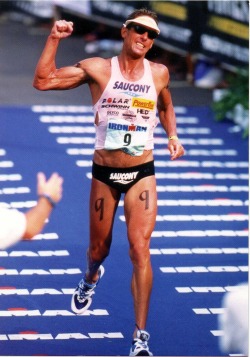
One of the questions that athletes commonly ask me is, “How do the top athletes consistently perform so well?” In my more than 30 years of racing and coaching, I’ve had the opportunity to race against – as well as work with – a number of world champion triathletes including last year’s Kona champions Chrissie Wellington and Craig Alexander. So yes, these athletes are naturally gifted, but they also do more than just physically train for their sport.
Here are three mental training tips that you can use today to go faster on race day for any sport:
1. Set Your Success Platform For Your Season
In 1994 before the Ironman World Championship, I met with a sports psychologist who had me make a list of the “I should haves” and “I’ve got tos” versus the “I want tos.” The problem with the should-haves and the got tos is that they breed indecisiveness. They create a level of complacency, mediocrity, or even ambivalence where you’re stuck vacillating back and forth without any true direction.
When you finally put down on paper what you really want, that want becomes something very tangible and very focused. You can see a start and finish just like in a race. You can then break down your wants into smaller pieces and go after each piece.
True, when you really want something and you commit, there will be an element of risk – but that’s the excitement. Let the should-haves go. Build your season around your wants and let them become your platform for success.
2. Develop Faith in Yourself
Every athlete has down periods where they don’t perform well. If you look at the world’s best athletes, they’re easy targets and people like to pick on them – “they’ve fallen off.” “They can’t do it again.” “Their last race was a bad one.”
Even as an amateur, you may have had a great workout and race experiences, but then all of a sudden you have two or three workouts or races where you seemingly have failed. In reality, you haven’t failed, but need to go back to the rudimentary foundation of faith: “I have faith in what I’m doing. I train hard, I do the work and I will feel good again.”
Ultimately, faith in oneself breeds the highest probability of success.
Keeping faith with yourself restores what you’re doing and allows you to go into your race with confidence instead of fear. Faith says you have the experiences and you can rely on those experiences to help you perform at your best.
3. Be Present
I regularly tell the athletes I coach, “do what you can do in the moment.” Being present creates clarity. If you find yourself saying, “I can’t wait until the last 50 meters of the race” when the gun goes off, then you will lose sight of what you’re doing. Any race can then become enormous and overwhelming.
A key element of coaching athletes successfully is throwing different obstacles at them. When I teach other coaches, I tell them that they always have to keep their athletes guessing as to what’s next in a workout. If you give athletes too much at once, the workout becomes consuming. For example, if I tell athletes that “we’re going to do a really hard workout today with 30 x 100’s in the pool,” some will say, “I think I can only do eight. I’m really tired.” Rather than say “30 x 100’s,” say “we’re going to do 8 x 100’s at this pace and effort…” After three or four, say “we’re going to do the next four at this level…” and so on. Suddenly, the athlete who could only do eight can now do the entire workout.
Breaking up the workout or race into smaller pieces (or moments) will keep you from becoming overwhelmed mentally and emotionally.
The simplicity of “doing what you can do in the moment” as an athlete is that you can use internal cues that teach yourself how to relax and be present. Make the mind-body connection by constantly taking a physical self-inventory and ask yourself questions like how I am I breathing? Am I relaxing the muscles in my forehead? In my arms? In my neck? In my back? Etc. Taking a self-inventory is something that every athlete should practice.
Try working these mental training tips into your training routine and see what happens on race day…
Happy training, Dave
Check out Dave Scott’s triathlon training plans here at TrainingPeaks.



